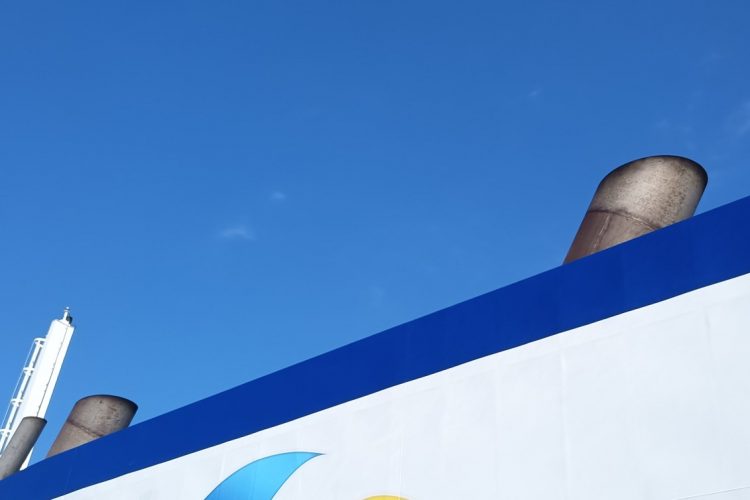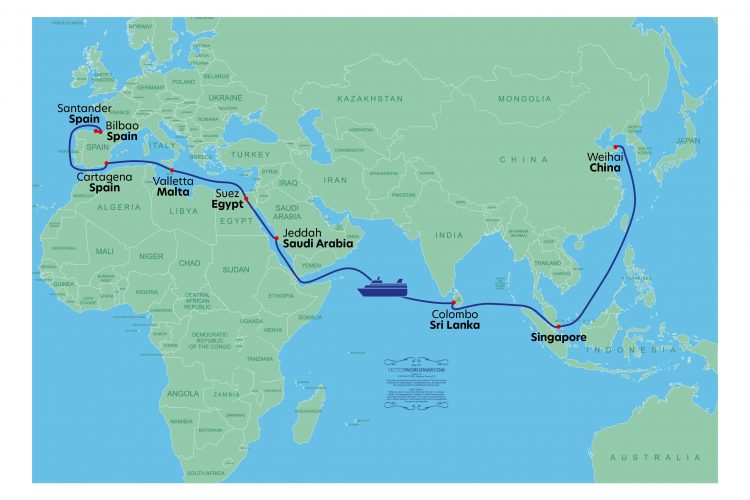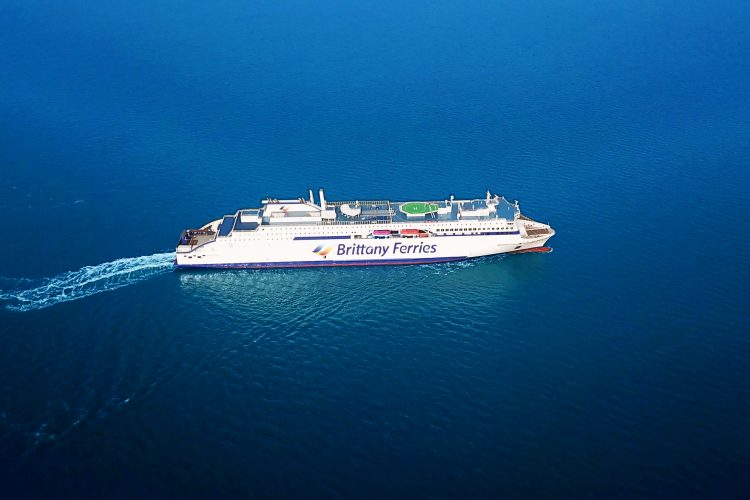Salamanca sails the Suez Canal then heads to Spain
-
 No visible emissions from LNG-powered ferry
No visible emissions from LNG-powered ferry
-
 Salamanca's route from China to Europe
Salamanca's route from China to Europe
-
 Salamanca side-on profile
Salamanca side-on profile
- Brittany Ferries’ brand-new ship Salamanca is sailing from its birthplace in China to its new Spanish homeport
- The cleaner Liquefied Natural Gas (LNG) -powered ship began the mammoth 33-day, 10,322 nautical mile journey on 10th December and is scheduled to arrive in Spain on 12th January
- Salamanca will enter the Suez Canal linking the Red Sea to the Mediterranean on 2nd January
- The brand-new ship will enter service on routes from Portsmouth to Bilbao and Cherbourg at the end of March
Brittany Ferries’ newest and greenest-yet ship Salamanca is preparing to transit the Suez Canal as it sails on a delivery voyage from Weihai, China where she was built, to Bilbao, Spain which she was built to serve.
The canal transit is a major milestone on the 10,322-nautical mile trip. With a nautical mile equalling around 1.15 land (or statute) miles, the voyage measures a huge 11,878 miles – that’s more than 20 times the 555 nautical miles from Portsmouth to Bilbao, one of two routes the ship will operate from late March.
But the journey is far shorter and faster thanks to the Suez Canal. The 120-mile man-made Egyptian waterway links the Red Sea to the Mediterranean, dividing Africa from Asia. It provides by far the shortest maritime route from the Indian Ocean to Europe, saving Salamanca and her crew around 10 days and 5,000 miles’ sailing compared to the southerly route around the Cape of Good Hope on the tip of Africa
Salamanca will arrive at the port of Suez, at the southern end of the canal on New Year’s Day, before entering the canal a day later. This follows a 7,529-nautical mile journey from China crossing the Yellow Sea, East China Sea, South China Sea and Indian Ocean.
The journey included stops at Singapore and Columbo (Sri Lanka) to embark fuel, fresh water and provisions, as well as additional Brittany Ferries crew members who are taking advantage of the delivery voyage to familiarise themselves with the vessel and to carry our extensive training ahead of welcoming passengers on board.
Whilst anchored off Singapore, Salamanca was refuelled with Liquefied Natural Gas for the first time since she was delivered. She’s the first Brittany Ferries vessel to be powered by LNG, which emits virtually no sulphur dioxide, nitrogen dioxide or particulate emissions, following combustion. In addition, because LNG burns more efficiently than diesel, there is a reduction in carbon dioxide (CO2) output of around 25 per cent.
Brittany Ferries has worked with fuel supplier Repsol to build dedicated LNG bunkering terminals in the ports of Bilbao and Santander for Salamanca, and her sistership Santoña arriving 2023.
Salamanca’s 10,322-nautical mile delivery voyage from China to Spain
After transiting the Suez Canal, Salamanca will sail west across the Mediterranean, making further stops in Valetta (Malta) and Cartagena (Spain) to embark more LNG, supplies and crewmembers. She’ll then transit the Strait of Gibraltar and head out into the Atlantic Ocean and Bay of Biscay, before arriving at her Spanish homeport of Bilbao on 12th January.
Following drydocking and crew training, the ship will enter service on 27th March 2022, carrying passengers and freight on routes from Portsmouth to Bilbao and Cherbourg,
Christophe Mathieu, CEO Brittany Ferries said:
“She’s big and beautiful, promising yet more comfort, style and space for our passengers and freight customers sailing across the Channel and Bay of Biscay.
“But above all Salamanca will be our first ship to be fuelled by cleaner, greener Liquefied Natural Gas. Indeed she’ll be one of the very first LNG-powered ferries to sail French, British or Spanish waters. And in 2023, 2024 and 2025 she will be joined by three more LNG-powered sister ships.
“It’s a green milestone for Brittany Ferries as we continue on our journey to reduce our environmental footprint and lead the industry in sustainable maritime transport.”
Salamanca is named after the ancient and beautiful university town situated in the region of Castilla and León, north-western Spain. The 215 metre-long, 23-knot ship has space for 2.7 kilometres of vehicles and 1,015 passengers in 341 en-suite cabins (including some which accommodate pets). Onboard facilities include a restaurant, tapas bar, duty-free shop, bar, children’s playrooms, and spacious outdoor promenade decks.
 News
News